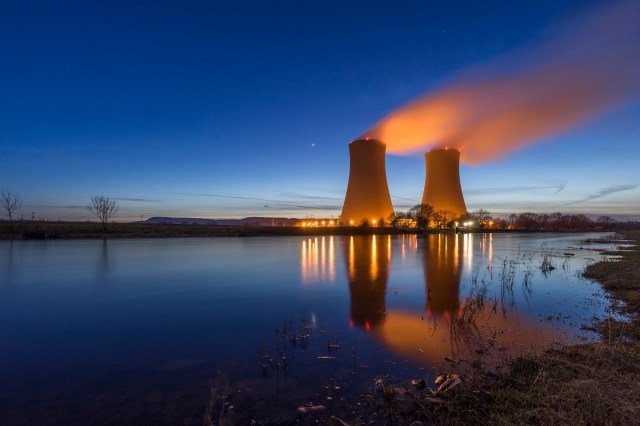There’s no such thing as a completely reliable energy source. Any plant can go offline. Credit: Getty

Those Belgians – not enough energy, that’s their problem. No, really, it quite literally is.
In fact, they’re in a bit of pickle. Belgium is heavily reliant on seven nuclear reactors, split between two sites, which together supply a big chunk of the country’s electricity. But, as Daniel Boffey reports in the Guardian, things have gone awry:
“A forced shutdown of one nuclear reactor in the lead up to winter may be regarded as unfortunate. But the closure of six of the seven reactors responsible for the supply of 40% of electricity is raising eyebrows, even in a country as prone to chaotic administration as Belgium.”
Oh dear.
While the British fret about the disruption that would result from a no deal Brexit, they should spare a thought for what their Belgian neighbours are facing this winter:
“An emergency ‘load shedding’ plan has been updated, under which motorway lights will be switched off, industrial production suspended and rolling three-hour blackouts launched in homes nationwide should temperatures drop in the coming months and demand outstrip the now limited electricity supply.
“Residents have also been warned bills could increase, despite the suggestion that they might need to iron less and use just one pot at dinner time.”
Will waffle irons be exempt?
Boffey adds the Belgians will be relying on surplus electricity from their neighbours – but that if it’s a cold winter, there might not be much to spare.
Of course, the conventional wisdom was that the main technological threat to the security of our electricity supplies was renewable power – because the wind doesn’t always blow and the sun doesn’t always shine. Nuclear was held up as the ‘reliable’ source of low carbon energy.
In fact, there’s no such thing as an energy source that can be relied upon completely and which doesn’t need backing up. Wind and solar are intermittent, coal and gas can be interrupted, and just about any power plant can go offline.
In fact, in some ways, nuclear plants are especially vulnerable. Because of the obvious safety concerns, one doesn’t cut corners on maintenance. Nor, as in Belgium, does one ignore possible faults:
“The impending crisis stems from the discovery at the end of last month of ‘concrete degradation’ at the Tihange nuclear power plant, west of Liege. The finding forced the closure of its three reactors.”
A nuclear plant is enormously complex and thus repairs and investigations take time. It is also produces much bigger ‘lumps’ of generating capacity than most other forms of low carbon power. For instance, one wind turbine might have a capacity of 5 megawatts, while one nuclear reactor might comes in at over a gigawatt (a thousand megawatts). Taking the wind turbine offline is therefore no big deal, but shutting down a nuclear reactor most certainly is.
And it might not just be one. When several reactors are built to the same design (as tends to be the case, because it’s typically less expensive than having to pay the ‘first-of-a-kind’ costs of building reactors of different designs) a fault in one may be a fault in them all. That way an entire nuclear ‘fleet’ might have to be taken offline for inspection and repair. Environmental factors can also lead to the shutdown of multiple reactors. The Fukushima disaster is an obvious example, but, less catastrophically, there’s also the impact of heatwaves on power stations that use river water or shallow sea water for cooling purposes.
The ultimate solution to all of this is abundant and affordable energy storage – not just the short-term battery storage capacity (that we’re due to get from the electrification of transport), but also systems for storing weeks or even months of power. Progress is being made on various options from compressed air storage to hydrogen-based technologies, but we’re not there yet.
Once we are, the reliability-of-supply issue will no longer apply and different forms of low-carbon energy generation will be able to compete on economics alone – which, barring a technological breakthrough, will kill off nukes for good.
In the much nearer future, there may be some relief for the poor Belgians. A new interconnector (basically a power cable that joins up different grids) between Britain and Belgium is due to come online early next year. Just in the nick of time, it would seem.
British anti-Brexiteers can console themselves with the thought that the UK will be sharing power with Brussels for years to come.










Join the discussion
Join like minded readers that support our journalism by becoming a paid subscriber
To join the discussion in the comments, become a paid subscriber.
Join like minded readers that support our journalism, read unlimited articles and enjoy other subscriber-only benefits.
Subscribe